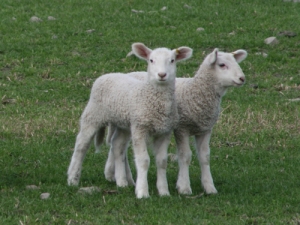Move over ham, here comes lamb
It’s official, lamb will take centre stage on Kiwi Christmas tables this year.
 Beef + Lamb NZ estimates 23.9 million lambs were tailed this spring – the smallest lamb crop since 1953.
Beef + Lamb NZ estimates 23.9 million lambs were tailed this spring – the smallest lamb crop since 1953.
Beef + Lamb NZ estimates 23.9 million lambs were tailed this spring – the smallest lamb crop since 1953.
Lamb export receipts for 2015-16 are estimated at $2.8 billion, down 4.2% on 2014-15.
B+LNZ Economic Service chief economist Andrew Burtt says the tally reflects three key influences.
"Breeding ewe numbers were down 4.5% on last year, due to carry over effects of dry conditions in past seasons," he says. "Lambing percentages across most of the country were down, as a result of tight feed supplies leading into winter. And fewer hoggets were mated."
In some regions, there was also a slight swing towards increasing beef cattle, at the expense of sheep.
"On the positive side of the ledger, better-than-average climatic conditions during lambing this spring meant lamb survival was good, the exception being isolated weather events in the North Island."
Over the country, there was a 6.7% drop – or 1.7 million fewer lambs than last year; 11.3 million lambs were tailed in the North Island – down 0.7 million on last year but similar to 2013's tally. In the South Island, 12.6 million lambs were tailed – 1 million fewer than last spring, due to decreased ewe numbers, lower lambing percentages and fewer lambing hoggets.
Burtt says the average carcase weight is expected to increase slightly – by 0.9% – to 18.3kg, as a result of lower stocking rates per hectare. "However, this is not sufficient to offset the reduced number of lambs available and we expect total export lamb production to drop by 7.2%."
The lamb crop survey covers 500 commercial sheep and beef farms, which are statistically representative of New Zealand's commercial sheep and beef farms.
The Push-Up Challenge, an event which combines mental health and fitness, is set to launch in New Zealand in 2026.
Last month's Agritechnica event led to a wide group of manufacturers celebrating successes when the 2026 Tractor of the Year Competition winners, selected by a panel of European journalists, were announced in Hanover Germany.
According to the latest Federated Farmers banking survey, farmers are more satisfied with their bank and less under pressure, however, the sector is well short of confidence levels seen last decade.
Farmer confidence has taken a slight dip according to the final Rabobank rural confidence survey for the year.
Former Agriculture Minister and Otaki farmer Nathan Guy has been appointed New Zealand’s Special Agricultural Trade Envoy (SATE).
Alliance Group has commissioned a new heat pump system at its Mataura processing plant in Southland.